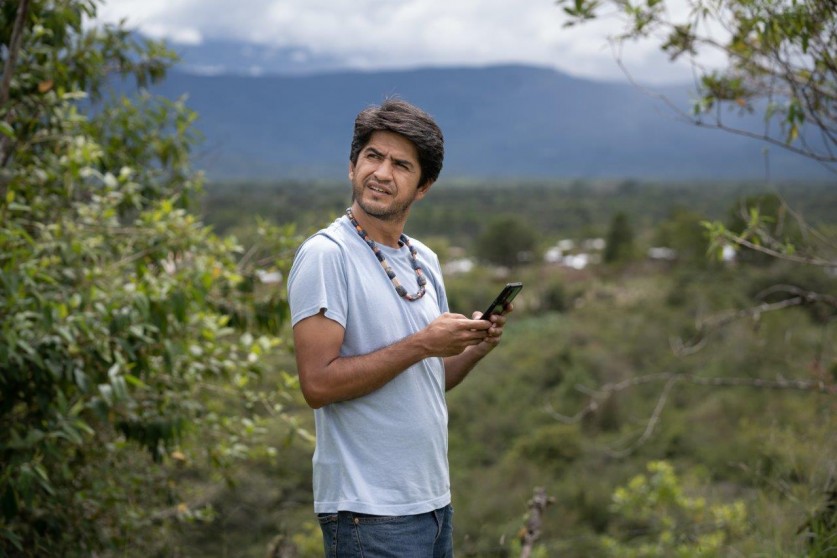Impact study: cooparm
COOPARM is a coffee co-operative located in Rodriguez de Mendoza Province, in Peru’s Amazonas region. The co-operative originated in 1990 as the ‘Association of Agricultural Producers Rodríguez de Mendoza’ (APARM).
This initiative, founded by a local priest and 100 Catholic missionaries, aimed to increase farmers’ access to training, new markets and fairer prices.
Image: Wilmo Rodriguez, COOPARM farmer.
Click here to read the full Social Accounts document.
In 2008, COOPARM, gained Organic and Fairtrade certification. In 2021, 80% of COOPARM’s coffee exports, worth USD 9.4m, were Fairtrade certified. Alongside reaching new markets, from Europe to North America, Fairtrade certification has also enabled COOPARM to pay additional amounts to their members for their produce.
Speaking about the value of the co-operative to its members, Angelica Hernandez, COOPARM Head of Logistics, said:
“The benefits are the regulation of the price (because) we have a commitment to respecting the differential and the premium, Fairtrade or Organic.”
COOPARM currently works with 542 coffee farmers across 1,181 hectares of land, including 12 districts and 38 production bases.
Angelica said:
“We separate the (production) area into three valleys, and in each valley, they have a different season of production and harvesting.”
The location of farms at different altitudes enables COOPARM to harvest year-round, creating a constant need for finance. In 2011, Shared Interest was introduced to the co-operative at the Specialty Coffee Association’s Expo.

We asked COOPARM then General Manager, Ramiro, how the Shared Interest finance was used. He told us:
“It goes into us buying coffee from the farmers. To be able to sell all year. To be able to export all year ...
We need money to be able to supply … without the support of Shared Interest, we would not have been able to do anything.”
In 2013, we provided a Term Loan to help acquire an electronic coffee selection machine and equipment for COOPARM’s dry mill. The machine selects coffee beans by colour and size, removing defects, and has reduced selection costs by USD 15,000 annually while increasing production capacity from 900 to 3,700 quintals (90,000kg to 370,000kg) of exportable coffee per month.
However, buyers remain reluctant to provide contracts to producers outside of typical harvest cycles, presenting a challenge for COOPARM to acquire sufficient prefinance to gather coffee. In 2019, we provided COOPARM an on-going Stock Facility to address this challenge, fund pre-harvest activities and gather coffee whilst contracts are negotiated.
Despite facing complex challenges such as major internal restructuring, local, infrastructural underdevelopment and limited cargo, courier and banking services nationwide during Covid-19 – since our relationship with COOPARM began – the co-operative has grown to produce 500% more coffee, supporting its members throughout with above-market prices.
Licely Vela Collantes, COOPARM farmer, told us:
“We can sell our coffee at a stable price and a good price relative to other associations. It's another USD 0.20 (more) per kilo with COOPARM (than) you would get in the open market.”
COOPARM’s resilience and commitment to its members is embodied through Ramiro’s proactive leadership. Upon his appointment, Ramiro spoke with the Founder, Father Arana, about the challenges faced by COOPARM.
Ramiro said:
“The co-op is the only source of economic support in the town ... Let's see what we can do. Let's try and help people.”
COOPARM has held coffee cupping workshops within communities to increase local consumption, knowledge and involvement in coffee.
For members, technicians and engineers have delivered technical assistance on fertiliser application, pruning and organic practices, as well as workshops promoting the balanced use of water as an essential component for coffee production.
Meanwhile, technical areas support post-harvest activities such as treating coffee wastewater and resources such as composters allow members to convert waste into fertiliser, reducing their carbon footprint.
For members’ farm productivity, COOPARM have renewed 400 hectares of coffee fields, growing 750,000 coffee plants, and have implemented a project to improve post-harvest processes by equipping members with solar dryers and water tanks to dry and wash coffee.
The prevalence of rural-to-urban migration threatens agricultural co-operatives in Peru, as a lack of rural development drives young people into urban areas, depleting local workforces and the subsequent capacity of co-operatives to grow and be sustainable.
Despite this, COOPARM’s empowerment and incentivisation of local producers with new skills, facilities and stable incomes, has enabled the co-operative to subvert this trend and increase its membership to meet production demands for the growing Organic specialty coffee market.
Jairo Rodriguez Vargas, COOPARM farmer, told us:
“The technical team for each area gives training in how to use fungicide and COOPARM provides the equipment needed.”
Maria Hilmer Acosta, COOPARM farmer, said:
“It has been a great experience advancing the co-op as responsible members and learning everything the technical staff train us in ... We have started selling crop to Switzerland and this is a big inspiration to the producers.”
COOPARM are also realising some of their sustainability objectives. Agroforestry initiatives include renovating 580 hectares of land, planting 100,000 trees within farms and replacing diseased coffee trees.
Elizabeth Arista Salazar, COOPARM farmer and President of the Womens’ Committee, said:
“It is very important for us as farmers to work with nature and the environment. To breathe clean air.”
Driven by faith, united by community and reinforced by the vital, dynamic role of our Interest finance, COOPARM represents a beacon of resilience for co-operatives far-and-wide as it continues to support the welfare of the Peruvian Amazon’s coffee farming families.
Click here to read the full COOPARM impact study.
Back to menu
